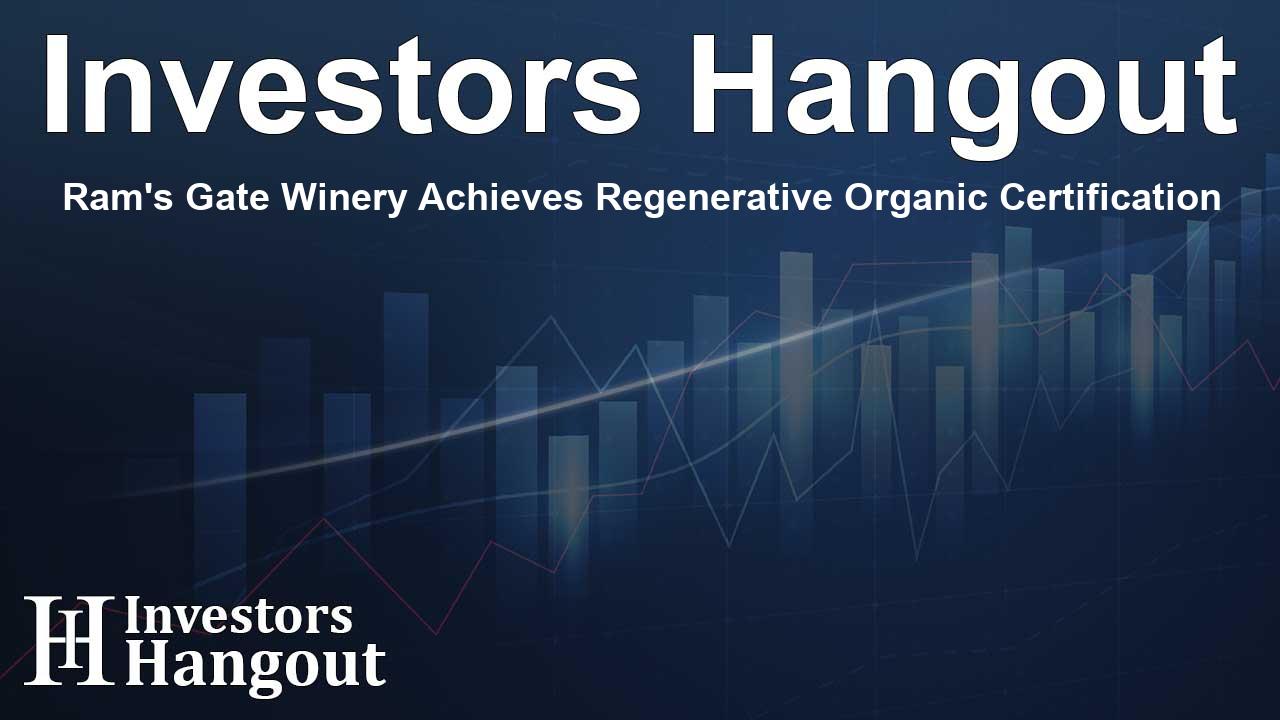Ram's Gate Winery Achieves Regenerative Organic Certification

Ram's Gate Winery Achieves Regenerative Organic Certification
Ram's Gate Winery, located in California, has recently reached a significant milestone by obtaining the Regenerative Organic Certified (ROC™) distinction for its 28 acres of estate vineyards. This achievement places the winery among a select group of only 25 worldwide that meets the rigorous standards set for this esteemed certification. This recognition builds on the momentum created by their California Certified Organic Farmers (CCOF) certification obtained in 2024 and highlights the winery's dedication to sustainable practices.
A Commitment to Sustainability
Jeff O'Neill, the Proprietor of Ram's Gate Winery, expressed pride in this accomplishment, emphasizing that exceptional wine is rooted in healthy soil and balanced ecosystems. The winery’s sustainability efforts have not gone unnoticed, as evidenced by O'Neill Vintners & Distillers having been awarded the Green Medal Leader Award in 2021. Moreover, their status as a Certified B Corporation in 2022 illustrates their commitment to a broader social and environmental impact.
Understanding the ROC™ Program
The ROC™ program, managed by the Regenerative Organic Alliance (ROA), sets high standards in agriculture, prioritizing soil health through various sustainable practices such as organic matter enhancement, increasing biodiversity, and ensuring fair treatment for farm workers. By adhering to these principles, Ram's Gate aims to ensure that agricultural practices benefit the environment and communities alike.
Innovative Farming Practices
Ram's Gate’s regenerative organic farming approach does not merely preserve land; it actively restores and improves it with each season. The vineyard’s management focuses on building healthier soils and creating climate-resilient vineyards, ultimately leading to grapes that reflect the unique characteristics of their environment. Alongside the ROC™ certification, an ambitious agroforestry initiative was launched, inspired by practices from esteemed vineyards in France, which includes integrating fruit trees within vineyard rows. This technique not only contributes to improved soil health but also bolsters biodiversity.
Commitment to Natural Farming
Over the past few years, the winery has fully transitioned away from synthetic inputs and embraced cover crops to enhance soil structure. They utilize natural pest control methods, including falconry and owl boxes, while an annual grazing program featuring sheep aids in weed management and nutrient cycling. Such innovations reinforce Ram's Gate’s vision for creating a vibrant, sustainable vineyard ecosystem.
Philosophy on Winemaking
O'Neill states, "Our philosophy has always been that the best wines stem from vineyards that are harmoniously balanced with nature." Through regenerative farming techniques, the winery aims to protect and nurture the land, aspiring to improve it for future generations.
About Ram's Gate Winery
Ram's Gate Winery invites everyone to explore more about its commitments and practices by visiting their official website. With a focus on sustainability and quality, they are redefining what it means to produce exceptional wine. For media inquiries, please contact Jarvis Communications or reach out to their media contact, Emma Zimmerman.
Frequently Asked Questions
What is Regenerative Organic Certification?
Regenerative Organic Certification is a standard that emphasizes soil health, biodiversity, and social fairness in agricultural practices.
How does Ram's Gate Winery practice sustainability?
Ram's Gate employs methods such as organic farming, cover cropping, natural pest control, and agroforestry to enhance their vineyard’s sustainability.
What benefits does the agroforestry initiative bring?
This initiative improves soil health, promotes biodiversity, and creates a more resilient ecosystem within the vineyard.
How has Ram's Gate been recognized for its efforts?
The winery has received multiple accolades, including the Green Medal Leader Award and Certified B Corporation status.
Why is healthy soil important for winemaking?
Healthy soil contributes to vibrant ecosystems, better grape quality, and ultimately enhances the wine produced, reflecting the vineyard's unique characteristics.
About The Author
Contact Hannah Lewis privately here. Or send an email with ATTN: Hannah Lewis as the subject to contact@investorshangout.com.
About Investors Hangout
Investors Hangout is a leading online stock forum for financial discussion and learning, offering a wide range of free tools and resources. It draws in traders of all levels, who exchange market knowledge, investigate trading tactics, and keep an eye on industry developments in real time. Featuring financial articles, stock message boards, quotes, charts, company profiles, and live news updates. Through cooperative learning and a wealth of informational resources, it helps users from novices creating their first portfolios to experts honing their techniques. Join Investors Hangout today: https://investorshangout.com/
The content of this article is based on factual, publicly available information and does not represent legal, financial, or investment advice. Investors Hangout does not offer financial advice, and the author is not a licensed financial advisor. Consult a qualified advisor before making any financial or investment decisions based on this article. This article should not be considered advice to purchase, sell, or hold any securities or other investments. If any of the material provided here is inaccurate, please contact us for corrections.
